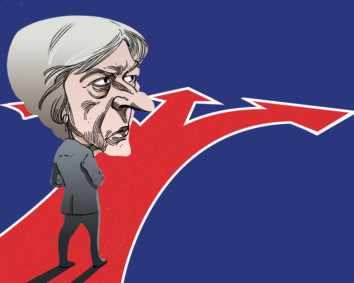
Scottish First Minister Nicola Sturgeon on Tuesday demanded that UK Prime Minister Theresa May give more details of her plans for leaving the EU. The intervention increases pressure on May given growing concerns that the government is moving toward a “hard Brexit” that might see moves toward a swift, minimal free trade agreement with the EU with UK firms potentially having sharply reduced access to the European Single Market.
However, while most UK eyes, and many internationally, are focused on this complex issue, it is potentially non-Brexit issues that could be as determinative of the success of May’s premiership. When she entered 10 Downing Street, she inherited many long-standing, contentious, policy decisions ranging from whether to move forward with the Hinckley Point nuclear power station; vexed challenges like pensions reform, and the country’s housing crisis; plus the multibillion pound issue of whether to expand Heathrow, Gatwick and/ or potentially the UK’s wider airport infrastructure, despite concerns about flight emissions and global warming.
In spite of national security criticisms flagged by some UK officials about Chinese involvement in Hinckley Point, the prime minister swiftly ‘greenlighted’ this month the £18 billion ($23.5 billion; Dh85.8 billion) energy project in the face of a looming UK energy crunch. This will enhance Sino-UK relations given the significant Chinese finance and prestige that will be invested in the plant.
Despite this fast decision, a key danger, especially with political room for manoeuvre compressed by the EU referendum aftermath, is that other key non-Brexit decisions could get kicked out into the political ‘long grass’ again. Yet, it is important they are prioritised, and sensibly addressed in the best interests of the country, at such a crucial moment.
Failure to do so, and make decisions that build public support and trust, after years of waiting, could further undermine confidence in the democratic process. For especially after the Brexit vote, which underlined widespread disillusionment with UK elites, elected politicians must now show themselves capable of building consensus to overcome more key, long-term policy challenges like pensions and housing, and also building public confidence in major issues flagged in the referendum, including migration.
The danger, if not, is that the rise of populist and nationalist politicians and parties, such as the United Kingdom Independence Party (Ukip), will grow with the often half-baked, damaging agendas they champion.
Of course, piling up of such major policy questions is not just a UK problem. In the United States, for instance, the failure of Congress during the Barack Obama presidency to deliver reforms in areas like immigration, and long-term federal budget financing, is a notable feature of the political landscape. And this despite serious attempts by the White House and key Democratic and Republican lawmakers to champion changes, including the Senate bill passed in 2013 on immigration reform that the House of Representatives refused to formally consider in another example of Washington gridlock.
As in the United Kingdom, this has been one driver of disenchantment for some people with conventional politics, helping propel Donald Trump to become the Republican presidential nominee. Trump, like Ukip, has numerous bizarre policy prescriptions that will do more harm than good, but nonetheless appeals to publics alienated from the Washington political process.
As former UK Home and Education Secretary Charles Clarke asserts in the 2014 book — ‘The Too Difficult Box’ — meeting these tough-to-solve, first order challenges is a significant hurdle that democratic institutions and politicians must do better. For if too many first order policy problems fester without resolution it can give the perception of a broken process and that democracy itself has failed.
As Clarke outlines, a key part of the solution is to promote longer-term political outlooks and sensible, cross-party discussion rather than the increasing tendency toward short-termism. Mechanisms used by both US and UK politicians to promote such thinking and action in both the United Kingdom and United States include National Commissions, Public Enquiries, and Judicial Reviews.
But these have had only limited success, as demonstrated by the bipartisan 2010 US National Commission on Fiscal Responsibility and Reform (also known as Bowles-Simpson) on budget reform and improving the country’s fiscal situation in the medium term and achieving fiscal sustainability over the long run. Despite much groundwork and careful deliberation, the plan did not get traction in Congress, not even getting out of committee.
Clarke is also correct that there is a pressing need for a wider democratic renewal agenda. Here, there are some commonalities but also key differences in the reforms needed across different countries.
The challenge is particularly pressing in the United Kingdom in the wake of the Brexit vote. The referendum revealed a deeply divided nation with many feeling disconnected from the political process with a range of long-standing concerns from immigration to stagnant living standards.
Contrary to what some populist and nationalist politicians assert, including Trump and outgoing Ukip leader Nigel Farage, who campaigned together last month on the US presidential election trail in Mississippi, there is no ‘silver bullet’ agenda that can address these challenges overnight.
Instead, a long-term, concerted effort is needed to better address these issues through a range of educational, home affairs, economic and other policies. And alongside this, politicians must try to find new ways of engaging with people — both directly, and indirectly including through the possibilities offered by new technologies.
Collectively, such an agenda can move towards demonstrating more effectively how a fair and inclusive democratic politics can help overcome or ameliorate the challenges that many people are experiencing in a world changing fast in the face of globalisation.
Failure to do so, and better demonstrate the positive impact that politics can potentially make in key policy areas from immigration, to housing, energy and pensions, may only lead to growing support for candidates such as Nigel Farage and Trump with their often ill-considered, ineffective policy platforms.
— Andrew Hammond is an Associate at LSE IDEAS (the Centre for International Affairs, Diplomacy and Strategy) at the London School of Economics.









